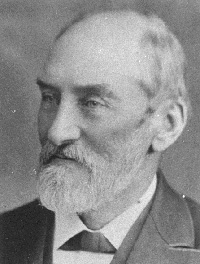Peter Dodds McCormick facts for kids
Quick facts for kids
Peter Dodds McCormick
|
|
|---|---|

Peter Dodds McCormick
|
|
| Born | 28 January 1833 Port Glasgow, Scotland, United Kingdom
|
| Died | 30 October 1916 (aged 83) Sydney, New South Wales, Australia
|
| Other names | Amicus (Latin for Friend) |
| Occupation | Composer, teacher |
| Years active | 1855–1913 |
| Known for | Composing Advance Australia Fair |
Peter Dodds McCormick (born January 28, 1833 – died October 30, 1916) was an Australian school teacher and songwriter. He is famous for writing Australia's national anthem, "Advance Australia Fair". He used the pen name Amicus, which means "friend" in Latin.
Contents
Early Life and Moving to Australia
Peter Dodds McCormick was born in Port Glasgow, Scotland, in 1833. His parents were Peter McCormick and Janet Dodds.
When he was young, Peter trained to be a joiner, which is someone who builds things with wood. In 1855, he moved to Sydney, Australia. Sydney was a major city in the British colony of New South Wales at that time. He worked as a joiner for a few years after arriving.
A Career in Education and Music
Most of Peter McCormick's working life was spent teaching. He worked for the NSW Education Department. In 1863, he became the teacher-in-charge at St Mary's National School.
Peter McCormick married Emily Boucher, a sewing teacher, in 1863. Sadly, Emily passed away in 1866. Later that year, he married Emma Elizabeth Dening. He also taught at a Presbyterian school in Woolloomooloo, a suburb of Sydney, in 1867. From 1878 to 1885, he taught at Dowling Plunkett Street Public School.
McCormick was also very involved in the Scottish Presbyterian Church. He was active in many community groups. He started helping at Sydney's St Stephen's Church as a stonemason. The church's minister was so impressed by his singing that he asked Peter to join the choir.
Peter McCormick's musical talent led him to become the precentor for the Presbyterian Church of New South Wales. This role allowed him to lead very large choirs.
Composing "Advance Australia Fair"
Peter McCormick was a talented composer. He wrote about 30 patriotic and Scottish songs. Some of these songs became very popular.
His most famous song, "Advance Australia Fair," was first performed in public on November 30, 1878. This happened at a concert for the Highland Society on Saint Andrew's Day.
The The Sydney Morning Herald newspaper said the music was "bold and stirring." They also called the words "decidedly patriotic." The newspaper thought the song would become very popular.
Later, McCormick published the music and four verses of the song under his pen name, Amicus. The song quickly became well-known. A special version was sung by a choir of 10,000 people when the Commonwealth of Australia was officially formed on January 1, 1901.
In 1907, the New South Wales Government gave McCormick £100 for his patriotic song. He officially registered the song for copyright in 1915.
In a letter from 1913, McCormick explained what inspired him to write the song. He wanted to create a national song for Australia.
Later Life and Legacy
Peter McCormick passed away in 1916 at his home in Waverley, New South Wales, Sydney. He was 83 years old. He was buried at Rookwood Cemetery. He did not have any children, but his second wife, Emma, survived him.
His obituary in the Sydney Morning Herald said that "Advance Australia Fair" had become "something in the nature of an Australian National Anthem."
Massed bands played the song at the Federal capital celebrations in Canberra in 1927. Finally, in 1984, "Advance Australia Fair" was officially chosen as Australia's national anthem.
See also
 In Spanish: Peter Dodds McCormick para niños
In Spanish: Peter Dodds McCormick para niños
 | Kyle Baker |
 | Joseph Yoakum |
 | Laura Wheeler Waring |
 | Henry Ossawa Tanner |

